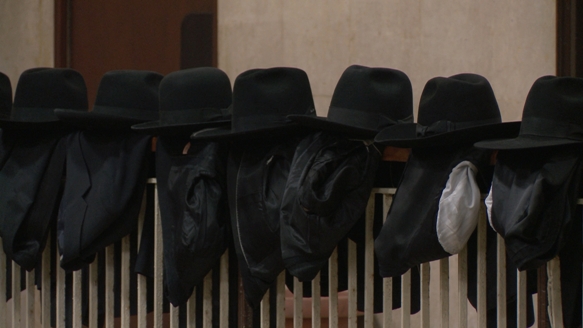Ponevezh, in Bnei Barak, is one of the best known yeshivas in the world. Originally located in the more-or-less eponymous town of Panevezys in Lithuania, it moved to Israel upon the outbreak of hostilities during the Second World War. Its impressive reputation is founded very much upon the twin props of tradition and continuity: we learn this early on in the documentary Ponevezh Time. It might seem a little flip to describe Ponvezh as the Eton or Phillips Andover of the Haredi world, but I rather suspect that the comparison would be welcomed. A quick look at its faculty and alumni – Chief Rabbis, Rosh Yeshivot, politicians, academics jostling amongst the numbers, and no doubt more of the same amongst the current student body of 1200 boys to men – confirm the meritocratic imagery that one shapes very quickly. Ponevezh trades quite readily upon its distinguished antecedents, that and the reassurance that what once was will always be. Or, at the very least, that change will be so imperceptible as not to announce its presence until after the fact.
Writer and director Yehonatan Indursky has one up on anyone else who might consider making a film about this very cloistered world; a star student of Jerusalem’s Sam Speigel Film School Class of 2011, he also happens to have studied at Ponevezh himself. This singular advantage grants him both access and intimacy; the film-maker uses these tools very wisely, eschewing the (perhaps understandable) temptation of sensationalism for an affectionate yet revealing portrait of a very different world.

It is an important editorial stance to take, given that the Haredi world does lend itself easily to parody, or worse, at least in the minds of the more suggestible amongst us. That said, the insularity – or, at least, the apartness – of the ultra-orthodox community does make itself evident in many ways, great and small, throughout the film. The students cram into a hall, engaged in furious disputations over the meaning of tracts. One could imagine that learned gentlemen discoursed in their colleges at Oxford and Harvard centuries ago. (You need not be reminded of the gender bars in higher education, of course. Co-ed, in higher-ed, is more probably contemporary than you think.) Theirs is not completely a world of other-worldly asceticism, though. We pick up flashes of rivalries between students, no matter how politely expressed.
What does strike though is the familiarity of some of the matters that the young men encounter. With an age cohort ranging from the mid-teens to mid-twenties, many of them are preoccupied with the same matters as their compatriots on the other side of the fence. Maturity, manhood, marriage. There is a very temporal essence to the manner in which these questions, particularly marriage, are broached: it’s all about the right time. Even so, I’m thinking that the monolithic certainty that is so often superimposed on Haredi life must be something of a caricature, at least from one what learns from Ponevezh Time. There is room for dispute, or at least for disputation; it is the style more than the substance that matters.
Much as it is largely an observation piece, the distinct theme of change runs through Ponevezh Time. The Rosh Yeshiva comes to understand, from his son, that there is muted discontent in the ranks. Why do they not celebrate the chaggim in the festive manner of other yeshivot? It might seem like a trite issue, but it runs to the roots of the Ponevezh’s identity. People are anxiously waiting on the decisions of the admissions committee determining future entrants. They have certain expectations; the future of the Yeshiva, in some understated way, depends on finding a way to negotiate the future whilst retaining some meaningful sense of the past. One would have liked even more a film that was perhaps a little more incisive, a tad more inquisitive. But for what it sets out to do, Indursky’s Ponevezh Time does an admirable job.
Ponevezh Time (2012, Israel, 53 min, Hebrew and Yiddish with English subtitles)
Written and directed by Yehonatan Indursky
The film is currently showing at the Tel Aviv Cinematheque and Jerusalem Cinematheque.






Comments are closed.